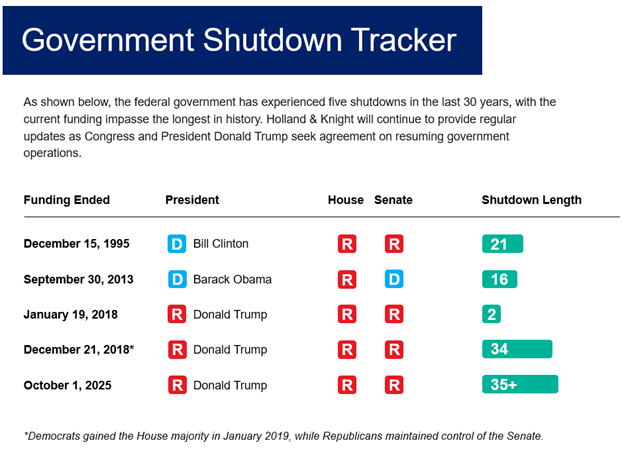- within Government and Public Sector topic(s)
- in South America
- within Strategy topic(s)
Welcome to the Eyes on Washington: Shutdown Briefing. During the federal government shutdown, we will be sharing concise, client-focused updates to help you stay informed on key developments, legislative dynamics and potential impacts to your operations and federal engagement.
Breaking News
With November 21 less three weeks away, the U.S. Congress may be forced to extend the end date for legislation to reopen the government. Republican leaders are discussing a continuing resolution (CR) that would expire sometime between mid-January and March 2026.
Judge John J. McConnell Jr. of the U.S. District Court for the District of Rhode Island on October 31 ordered the Trump Administration to pay Supplemental Nutrition Assistance Program (SNAP) benefits through a U.S. Department of Agriculture (USDA) contingency fund, which would partially cover benefits for November. Judge McConnell is scheduled to hear a request today that would force the administration to pay for the entire benefit, which costs $8 billion to $9 billion monthly. Today, President Donald Trump posted on social media that SNAP benefits would not be issued until the government reopens, yet the USDA sent guidance to states today on how to issue the partial benefits.
Status Update
Today marks Day 35 of the federal government shutdown. Negotiations around reopening the government are ongoing, but a resolution is not clear yet.
Congressional Activity
- Democratic Leadership: Remains unified in calling for renewal of Affordable Care Act (ACA) subsidies. Democrats are hoping that as Americans see the increased cost of their healthcare premiums, Republicans will be pressured to renew the subsidies.
- Republican Leadership: Maintains in the U.S. Senate that a clean CR is the best way to reopen the government but is under the current 60-vote threshold for the filibuster. Majority Leader John Thune (R-S.D.) will not advance a rules change to eliminate the filibuster, meaning Democratic support is required to pass a CR in the Senate.
- Bipartisan Engagement: Bipartisan talks continue behind closed doors. The U.S. House of Representatives has canceled votes it had scheduled for today.
Executive Branch Developments
- Presidential Engagement: President Trump called on Senate Republicans to invoke the "nuclear option" by changing Senate rules and scrapping the previously mentioned filibuster to end the government shutdown without Democratic support.
- Troop Pay: Even though service members were paid on October 31, U.S. Department of the Treasury Secretary Scott Bessent said it's doubtful that service members will receive pay on November 15 unless the shutdown ends.
- Air Traffic Control: U.S. Department of Transportation Secretary Sean Duffy said if the shutdown goes on for another week, the public could see mass flight delays, flight cancellations and/or closures of parts of the airspace due to air traffic control staffing shortages.
- SNAP and WIC Funding: A federal judge in Boston ruled on October 31 that the USDA must disburse full or partial SNAP benefits this week. The Trump Administration said it will issue partial food stamp payments this month to roughly 42 million Americans as the government shutdown enters its second month. In a court filing, the administration said it would use emergency SNAP funds but not tap additional resources to issue full November payments. On October 31, the Trump Administration quietly readied $450 million to fund the Special Supplemental Nutrition Program for Women, Infants, and Children (WIC) as the shutdown continues.
- Head Start Funding: The government shutdown has resulted in the closing of dozens of Head Start centers, leaving affected parents scrambling for childcare and cutting off preschool access for some. Without federal grant payments, many centers are closing indefinitely or relying on emergency local funding, disrupting services such as meals and therapy for low-income, homeless and foster care children.
Key Milestones
- November 4: Off-year gubernatorial elections are held in Virginia and New Jersey.
- November 4: The government shutdown becomes the longest in history, beating a 34-day-plus record set during President Trump's first term.
- November 7: Non-exempt federal employees will have worked one month without pay.
- November 15: Military payday.
Strategic Considerations for Clients
- Agency Engagement: Clients should anticipate delays in regulatory reviews, permitting and federal communications.
- Contracting and Grants: Federal contractors may experience payment disruptions and limited access to agency personnel.
- Policy Positioning: The shutdown may create new leverage points in legislative negotiations. Clients with interests in appropriations, healthcare, defense and infrastructure should monitor developments closely.

The content of this article is intended to provide a general guide to the subject matter. Specialist advice should be sought about your specific circumstances.






